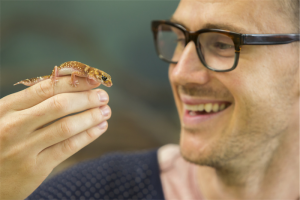BIOLOGISTS at The Australian National University (ANU) have found the first evidence of mass extinction of Australian animals caused by a dramatic drop in global temperatures 35 million years ago.

Lead researcher ANU PhD student Ian Brennan said the team detected the mass extinction of pygopodoid geckos by using molecular evolutionary methods to examine fossil records.
This period of intense and rapid climate change occurred at the same time when Australia separated from Antarctica.
“The dramatic shift to colder and drier climates likely resulted in rapidly changing Australian habitats, which hugely impacted the animals that inhabited them,” Mr Brennan says.
“Our research provides evidence that rapid shifts in climate may have profound and long-lasting effects on global biodiversity.”
Mr Brennan’s findings also suggested the emergence and spread of deserts in Australia from about 10 million years ago provided ideal habitat for new pygopodoid gecko species to prosper.
“Our findings suggest that arid regions of Australia have acted as a cradle for geckos, promoting the rich gecko diversity that is found across the continent,” he says.
Co-researcher Dr Paul Oliver says geckos did well in the harsh climates of arid Australia because they avoided the heat by being nocturnal.
“Many desert geckos also have strategies and attributes to avoid water loss, such as having relatively rugged skin and scales,” he says.
“The clear scale over the eye, called a spectacle or brille, is one such example of this, as it helps them avoid water loss from the surface of the eye. But that means they can’t blink, so they have to lick it clean.
“Underwoodisaurus and their relatives Nephrurus have little ‘eyebrows’ that stick out to keep dust and dirt off their eyes, because they’re burrowing species.”
The pygopodoid geckos are a group of about 150 species found across Australia.
The study is published in Evolution.
Who can be trusted?
In a world of spin and confusion, there’s never been a more important time to support independent journalism in Canberra.
If you trust our work online and want to enforce the power of independent voices, I invite you to make a small contribution.
Every dollar of support is invested back into our journalism to help keep citynews.com.au strong and free.
Thank you,
Ian Meikle, editor




Leave a Reply